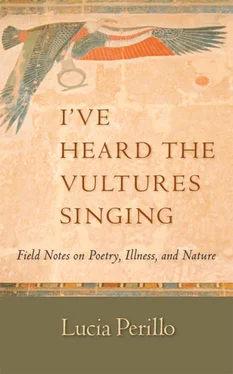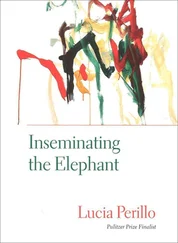In my late teens I had spent my summers as a naturalist along the Appalachian Trail where it veers near New York City. Young people were dispatched in teams of two of the same gender to live in primitive cabins — no toilet, and our outhouse was a quarter mile away — where we ran nature programs for children from the city. We bathed in the lake and swam in the nude — now I realize that living there with no telephone or radio was probably the most dangerous immersion in nature I ever had. During those summers, female hikers were raped along the Appalachian Trail and even killed. But I never had a hard time with anyone except a man who, as was the custom of those days, gave me a hallucinogenic drug and returned in the middle of the night to pee on my tent.
In my mind, I survived by becoming aloof: naturalist as bitch. But this is silly, to imagine I was not vulnerable. A bullet makes no distinction between bitch and sweetie-pie.
Becoming handicapped has meant becoming a little more congenial, in that my accessing wilderness now requires collaboration, as on this day when my friends and I are headed up to Mount Rainier. For Angus, this is an opportunity to put more break-in miles on the Harley-Davidson Dynaglide motorcycle that he just purchased down near Portland. I had navigated him home with my car because he wasn’t yet supposed to take the bike over fifty miles per hour, nor was he supposed to drive for long at a constant speed, and this meant we had to use the back roads, where the pages of maps he had spent days printing off the computer and highlighting and annotating were useless. The hundred miles took us five hours. At one point we drove in circles, which we noticed only because we passed an old barn painted with “Dr. Wilson’s Remedy for Weak Women” twice.
When Angus starts the motorcycle, it attracts the notice of Bob, the man who is painting my house. I feel guilty going off on an excursion while Bob works, which is another concession that becoming handicapped requires — I pay other people to do my work. Having always painted my own houses, this is a bitter pill. I’m not even driving the car loaded with my electric scooter; my friend Becky is.
“Nice bike,” Bob says, though Angus can’t hear him above the noise of his pipes.
“He just bought it!” I yell back. Angus is a chubby bald man closing in on sixty. I don’t know why I feel compelled to give out information as the Harley warms. “His wife died! He has not ridden a motorcycle for thirty years!”
Many of us can be made bold by grief.
You can see what people call The Mountain on clear days from our town, the main roads laid out to give a dead-on view of it when you head east. Three peaks make up its crown, like a molar tooth. Now that I am crippled, rarely do I go there, even though some of the trails are paved in order to protect the alpine meadows. So theoretically I could ride up them, and this is our bittersweet mission of the day. When the snow melts, flowers bloom in such profusion that the colors make you swoon.
We missed the peak flower-blooming weeks while we arranged our trip. My psychic tendencies lean toward disappointment and lament. We have missed the flowers! Becky assures me there will still be plenty, being the kind of woman who can peer into any cup and spot the trace of moisture that still resides. We’re leading Angus out of the desecrated Northwest that has been manufactured recently by countless big-box stores and cheap tract homes. You have to stay right in town, close to the water, or else go into the wilderness — because what’s between them is a place of death, the towns of no town, the quickly manufactured present, which has no soul. I can’t imagine our strip malls fifty years hence: they will be torn down within a decade, or else they will be dusty and decayed, abandoned structures where squatters will set up camp. The giant supermarkets will someday house our slums.
So we leave them, good riddance, and rise into the foothills, after crossing Mashell Prairie and Ohop Valley. It has not rained all summer, and yet the valley somehow is a green dip between hills, a velvety swale without any desecration. This is where you finally catch your breath, and no one stops here. It’s a hands-off place, a place where the riders in their vehicles stay put, as if they know better than to blight this ceaseless stunning bright bright green.
Then we rise into the clear-cuts, a thoroughly blighted place, where the small firs grow as high as a tall man’s head in stands that are unnaturally dense. The forest has been ravaged, and yet the forest is making itself again, in a mutant, hypertrophic way. Environmentalists see the ravagement and the mutation; industry people see the resilient growth, and the human life span is too short to know which view will win.
But soon we leave the clear-cuts behind, as the road zips by Alder Lake. This summer, due to the lack of rain, the lakebed is a flat expanse of mud, sliced by rivulets and divided into planes of different color, colonized by different algae. The lakebed should be littered with driftwood, giant stumps with gnarly, webby roots. But this has all been carted off. In a random act of art, someone has created a horse and a fish with the only wood that’s left.
In wetter years, I used to kayak on this lake. The trip that gnaws most on my memory is one on which I took one of the summer volunteers with me. Paul had been born with cerebral palsy; he staffed the Visitor Center desk and had a signature joke for the tourists — that he was built like a buffalo: big head and shoulders, tiny legs. He walked with forearm crutches, dragging his legs along scruff scruff scruff. I will tell the truth and admit I had a speck of resentment for his presence: his weakness was bound to tax the rest of us, someone had to put his shoes and socks on in the morning and take them off again at night. When a male ranger was assigned this task, I was relieved. The intimacy of holding someone’s foot in my hands terrified me and made me think of the apostles and Jesus, how all that footwashing created a sexual quantum field when I read about it on Wednesday afternoons at the Catholic school.
On our trip, Paul paddled strongly and we laughed. But when we returned to the boat ramp, I could not lift him out of the kayak to stand with his crutches. So I dumped him out, and that worked well enough because he could use the water to buoy himself up, though afterward I insisted on going to the grocery store, since the lake was halfway there, and I made Paul wait in his wet clothes while I went shopping, despite his shy complaints. My impatience mortifies me when I think back, now that I’m the one who’s always slow.
Sorry. . sorry. . this is a song the Subaru’s tires sing.
As we rise to the lake, Becky tells me about the time she herself climbed Mount Rainier, when she was a student of Willi Unsoeld’s at the state college in our town that was founded in the 1970s as an “alternative” institution. Unsoeld is a legend there, a philosophy professor and a mountain climber. Becky says that she climbed as one of the students tied to Unsoeld’s rope when he led a mob of them to the top in 1972. This is a poignant story because Unsoeld died a few years later while leading a student group down from the summit in a storm. One student died also, and Becky was asked by Unsoeld’s widow to call the girl’s mother. We speculate that she made this odd and too-intimate request to prove he was not a reckless man when it came to shepherding young people through the wilderness.
I’ll say it again: many of us can be made bold by grief.
But grief can only transform the actual body so far, and our widower turns out to be trembling and pale-cheeked when we pull off just past the lake. We stop at a garden of creatures made from scrap metal, sculptures whose style resembles that of the driftwood fish and horse erected on the dry bed of the lake. Angus did not attach the windshield to his motorcycle, nor did he wear his leather jacket. When we ask why not, he gets a hangdog look.
Читать дальше











![Various - Birds and Nature, Vol. 12 No. 5 [December 1902]](/books/745517/various-birds-and-nature-vol-12-no-5-december-thumb.webp)
![Various - Birds and Nature Vol. 11 No. 2 [February 1902]](/books/745533/various-birds-and-nature-vol-11-no-2-february-1-thumb.webp)